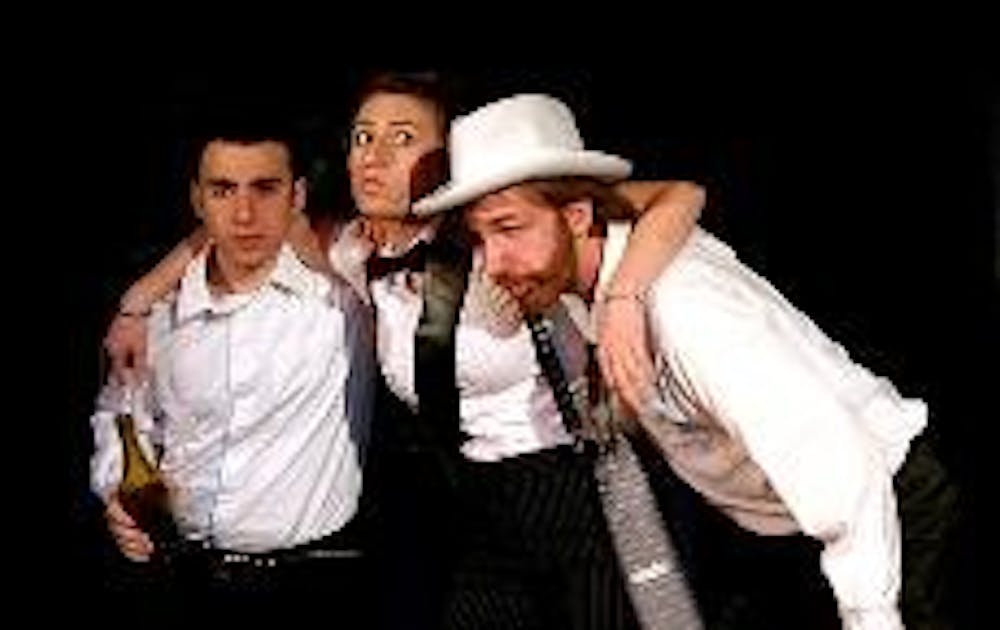Amid the tireless yearning, misguided brawls and tangles of unsuspecting love in William Shakespeare's "Twelfth Night: or what you will," the cast of Rude Mechanicals delivered a humorous performance last weekend in the Tavern, marked by occasional prancing, drunken stupors and a plot braided with amusing farce.
Director Carmen Cain, a senior in the School of International Service, chose to direct "Twelfth Night" because she thought the play was funny.
"In 'Twelfth Night,' all the deceptions and manipulations converge into a cynical, absurdist comedy of errors," Cain wrote in her director's note.
The play takes place in the kingdom Illyria. A duke named Orsino pines for the love of Illyria's countess, Olivia. Meanwhile, at the seacoast, a sea captain rescues a woman named Viola from a shipwreck. Viola believes her brother, Sebastian, has died, but a man named Antonio has rescued him elsewhere.
Not knowing, Viola decides to disguise herself as a man in order to find work in Illyria. She takes the new alias, Cesarius. The sea captain takes "Cesarius" to Orsino, and Orsino sends Cesarius to woo Olivia for him. Olivia, who initially mourns the death of her brother and wants nothing to do with men, is charmed by Cesarius instead.
Moreover, Sir Toby Belch and Sir Andrew Aguecheeck, members of Olivia's household, frequently indulge in drunken debauchery, but Malvolio, Olivia's uptight steward, chastises them for their behavior. Maria, Olivia's gentlewoman who is present at the scene, helps Toby and Andrew retaliate against Malvolio. She creates a fake love letter to make Malvolio believe Olivia loves him. Sir Toby is infatuated by Maria's guile, while Sir Andrew hankers for Countess Olivia's love.
Sir Toby and Sir Andrew's inebriated tomfoolery immediately added life to the play's more lamentable, lovelorn context. Sir Toby, played by Charlie Biscotto, a junior in the School of Public Affairs and College of Arts and Sciences, was a challenge to play, Biscotto said.
"I tend to always play the part of the lover, and this was the first comedic character I've ever done. It's fun and enjoyable to get laughs on stage," he said.
Biscotto's untamed, animated expressions complemented his drunken cavorting, fitting for a comedic effect. His character provoked numerous chuckles from the audience.
Equally as comical was the shrewd Clown, a character who interacted with the rest of the cast and divulged their obliviously ludicrous behavior throughout the play.
"Everyone's character was bound to society, but my character wasn't. I could roll my eyes at the duke or go around barefoot. There was more freedom of expression and movement for the Clown," said Liz Ardagna, a freshman in SIS. "I had to lower my inhibitions to feel as free as I did."
Ardagna's role as the Clown required her to not only speak in Shakespearean language, but also sing and play the mandolin, both which she had never done before. Using Shakespeare's words, Ardagna wrote all the play's songs, assembling the lyrics with jazzier, folksy tunes appropriate for the Clown's zany wit, she said.
The character Malvolio added a different type of humor, one that allowed the audience to laugh at his embarrassing gullibility rather than chortle at typically rambunctious or cheeky behavior. Christa Blackmon, a junior in SIS, executed Malvolio's monologues with a suitably haughty flair. Blackmon used the character Mr. Collins, a pompous clergyman in Jane Austen's novel "Pride and Prejudice," as inspiration for Marlolio's conceited persona, she said.
Tender characters, such as Viola/Cesarius and Olivia, balanced the sometimes-loud humor of the play, adding thoughts on gender roles and emotional wellbeing.
"Viola shows how women suffer just as much as men, and they work just as hard," Blackmon said.
Nicole Morin, a junior in the College of Arts and Sciences, played Olivia.
"Olivia is disillusioned, na've, young and very impulsive. She's also crazy, desperate, pushy and aggressive and yet very flirty," Morin said.
The play also had monochromatic, toned-down costume and set design that balanced the loud humor. Cain used a 1920s-inspired theme of black, white and gray colors with a splash of red light cast upon the stage. The characters wore 1920s-inspired clothing, dressed in vests, suits and ties or swanky skirts and blouses.
Still, the humor enacted by the Rude Mechanicals in "Twelfth Night" was as enjoyable as can be for a play involving misplaced love and foolhardy behavior. In true Shakespeare fashion, the play was as complex and convoluted in plot as it was comical and droll in dialogue.





